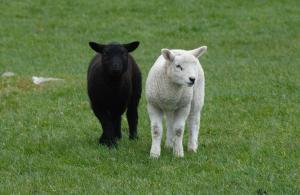AFBI warns about the risk of chronic copper poisoning in sheep
Date published:
AFBI would like to make flock owners aware of the risks of chronic copper poisoning.

This condition can be seen throughout the year but circumstances in autumn such as prolonged concentrate feeding of ewes in lactation, concentrate feeding to rams and lambs for sale, coupled with stress associated with sales and the changeable weather are risk factors for the disease.
While copper is an essential part of enzymes governing many biological functions, sheep are particularly susceptible to the toxic effects of excess copper. Toxicity is most frequently observed in the Charollais, Texel and Suffolk breeds, and less frequently observed in the mountain breeds. Clinical disease follows a period of excess intake and occurs when the liver’s capacity to store excess copper is exceeded and there is a sudden release of copper by the liver into the circulatory system. This typically occurs after weeks or months of accumulation of copper and often coincides with a period of stress on the animal. The sudden release of copper by the liver causes haemolysis and irreversible damage to the kidney and the brain. Copper poisoning is slow to develop but sudden in onset. The eyes and skin become jaundiced and post mortem examination reveals an orange liver, black kidneys and red/brown urine. Biochemistry results show a toxic level of copper in the liver and the kidney. Serum copper levels do not provide a reliable warning of imminent toxicity. While blood tests for liver enzymes can assess how much damage has occurred to the liver these tests are not specific for copper toxicity and liver damage can be due to other conditions such as the presence of parasites.
Feeding concentrates containing high levels of copper, excessive administration of copper containing mineral supplements or boluses, and grazing pastures which have been dressed in pig slurry are typical scenarios in which cases of copper toxicity in sheep may develop. However even a diet with an acceptable copper concentration can also cause subclinical toxicity if fed for long enough to vulnerable breeds. This is because copper is a cumulative poison with the combination of daily exposure and prolonged feeding playing a part. Every opportunity to reduce the concentrate intake between lactations should be taken. Particular care should be taken with rams as they are usually fed concentrates more regularly and for more prolonged periods. The best way of managing this condition is to minimise long term concentrate use in the diet.
Treatment options exist but they are only effective in the early stages of the clinical disease and are not always effective. Contact your local vet for advice if you are concerned about copper poisoning.
If you would like a post mortem carried out on a suspect case, this can be undertaken at our Stormont or Omagh laboratories but should be arranged via your local vet who can advise on carcase submissions.
Notes to editors:
AFBI is an arms-length body of DAERA delivering research and development, diagnostic and analytical testing, emergency response capability and expert scientific advice for DAERA and other government departments, public bodies and commercial companies in Northern Ireland, and further afield.AFBI’s Vision is “Advancing the Local and Global Agri-Food Sectors Through Scientific Excellence”.AFBI’s core areas:Leading improvements in the agri-food industry;Protecting animal, plant and human health;Enhancing the natural and marine environment.All enquires to AFBI Press Office afbi.press-office@afbini.gov.uk